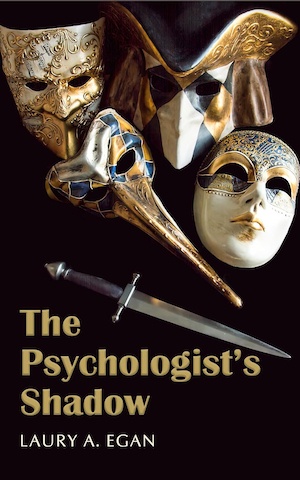If you’re looking for a complete change of pace in a crime thriller then The Psychologist’s Shadow by Laury A Egan may be it. It has action scenes but, fittingly, most of the story unwinds in the head of psychologist Ellen Haskell. Ellen has closed her Manhattan clinical practice and opened a new office in Princton, New Jersey, the college town where I live. Naturally, the mentions of familiar restaurants, stores, and roads are fun for me, but if you can envisage up a college town with its collection of characters and pressures, you’ll recognise it too.
There’s quite a bit of backstory in the beginning, including Ellen’s motivation for picking up sticks and relocating to New Jersey. A client of whom she was growing excessively fond was injured in a dramatic suicide attempt in her office, and she’s not forgiven herself for failing to see the depth of his pain. He was a classical guitarist no longer able to play, and the psychological problems of creative people are a specialty of hers.
What’s different about this novel is how well you get to know nine of Ellen’s patients, plus two couples, as you journey through her week. At first this seems like more backstory, but as each patient’s problems are revealed, you realise that any one of them could be responsible for the stalking Ellen is being subjected to. Telephone hang-ups at the office and home. Strange missives left in her home mailbox. ‘Romantic’ gifts left on the stairway to her office. At first, she wants to dismiss the calls, but as the contacts become more frequent and tangible, her unease mounts.
You’ll be under no illusion that these happenings are benign, because you have access to increasingly unhinged journal entries written by her stalker. Whoever it is clearly thinks Ellen will be receptive. Could it be her niece’s sexually aggressive husband who makes a sleazy and unwelcome pass at her? One of her clients? Someone from the tennis centre?
Ellen is living temporarily in her parents’ home, in a rural area some miles from town. It’s a modern house with much glass on a large wooded acreage. At night, everything going on inside the house is easily visible if someone were spying on her. Bit by bit, Ellen becomes convinced someone is. She’s alone, because her parents are on an extended vacation in Corfu, and that isn’t going well, either. They have a terrible automobile crash, her mother is killed, and her father is laid up with his ankle in a cast. He won’t be coming home any time soon to relieve Ellen’s isolation.
As the weeks pass and familiarity with Ellen’s patients grows, you’ can’ll almost feel a part of the therapeutic relationship. An occasional conversation might feel contrived – as they all are, of course, it being fiction – but I came to admire this device. It’s an effective means of getting to know a number of suspects as their phobias and dissimulations and desires and bad decisions and worse childhoods are paraded in front of you. A skilled interviewer, Ellen exhumes their deep motivations, with the result that your knowledge about them seems far from superficial.
As so often happens, the person who can deliver sound advice or insights regarding other people seems not to carry that skill over to their own life. At one point, at least, Ellen recognises that her rather lonely existence is not much superior to the situations many of her clients are in. Also, while she would be very protective of her patients, she’s slow to involve the police, and she rejects their suggestion that she relocate to a hotel until her stalker can be identified. She doesn’t want to cave in to the pressure. She belatedly considers adding security measures at the house. Of course, her inaction makes her more isolated and vulnerable, which is exactly where author Egan wants her.
Egan presents the patients stories with such clinical sensitivity you’d almost believe that she herself is a psychotherapist, so it’s surprising that she isn’t. She is the author of a dozen previous novels, and has also published short stories and poetry, which may be why her language, even when talking about such elusive subjects as feelings, is so clear.
Also see This Is How We End Things by RJ Jacobs.
Enigma Books
Kindle
£3.99
CFL Rating: 4 Stars
Using our associate/affiliate links helps support the site.
